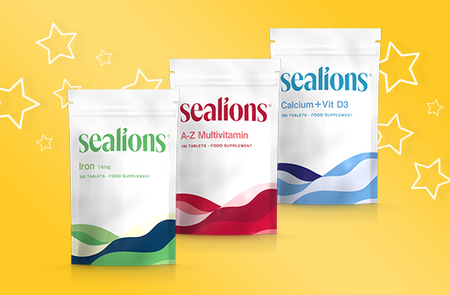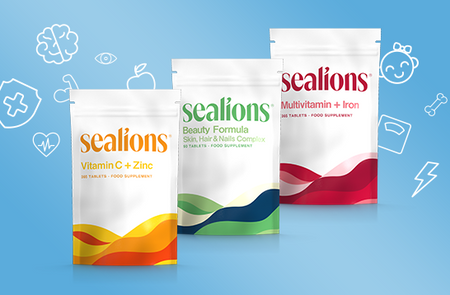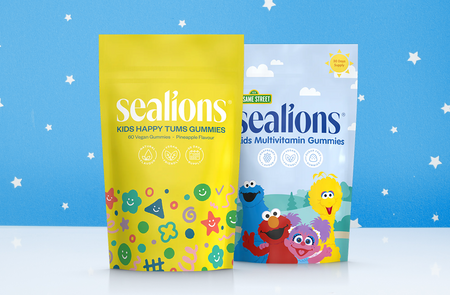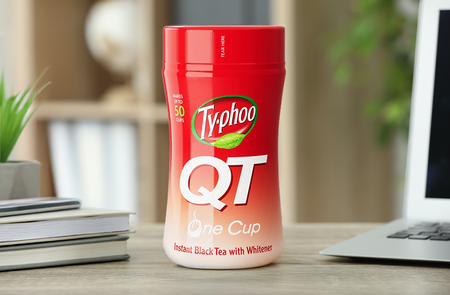
4 Ways To Take Care of Your Eye Health
When it comes to our physical health, we book an appointment with the doctor if we're feeling unwell, go for regular check-ups at the dentist to take care of our teeth - but looking after our eye health often tends to get left behind.
Eye health plays a vital role in our overall wellbeing and quality of life. Perhaps most obviously, good eye health is important for maintaining good vision, enabling you to see and experience the world around you. Our eyes can provide valuable insights into our general health, with different tests able to detect early signs of various health conditions, such as diabetes, high blood pressure, and conditions which affect the eyes directly, like glaucoma or cataracts.
Even if you don't have any issues with vision, it's still so important to take care of your eye health. Here, we look at tips for maintaining the health of your eyes, including the vitamins and nutrients that can provide daily support, and what some of the most common eye conditions are.
Ways to Take Care of Your Eye Health
Regular eye tests
It’s advisable to have an eye test every two years for most people – it’s recommended to attend earlier if you experience any changes in vision, or if your optometrist advises you to visit more regularly. Despite this advice, 25% of adults in the UK haven’t had an eye test in the last 2 years or more (1).
Getting your eyes tested regularly can help detect several eye conditions, even before symptoms become noticeable, and allows your optometrist to monitor the health of your eyes, provide any treatments needed, and ensures your prescription is correct which can help prevent issues such as eye strains.
Proper nutrition
A healthy diet can play a significant role in promoting and maintaining good eye health. Nutrient-rich foods can provide essential vitamins, minerals, antioxidants, and other compounds that support the eyes in various ways.
Deficiencies in some specific vitamins can have an impact on the risk of certain eye conditions, like AMD (Age-Related Macular Degeneration), cataracts, glaucoma, and diabetic retinopathy. While research suggests that some vitamins – through diet and/or supplements – can help to protect against, or slow the development of these conditions.
Vitamin A
Often referred to as the “vision vitamin”, vitamin A plays a crucial role in maintaining good eyesight, and deficiencies can have a serious impact on vision (2). Foods that are rich in Vitamin A, such as sweet potatoes, carrots, red peppers, pumpkin, and squash, should be included in your diet.
Vitamin B
The B vitamins play multiple roles in looking after your eye health. It should be easy, with a full range of B vitamins, to include at least a few food items rich in each in your daily diet. Foods high in B vitamins include but aren’t limited to fish, beans, rice, poultry, eggs, dark leafy greens and many more.
Vitamin C
A powerful antioxidant that helps to protect our eyes from oxidative damage, vitamin C is water-soluble, so it's essential to maintain a consistent daily intake. Oranges, broccoli, Brussels sprouts, blackberries and even grapefruit juice are excellent sources of Vitamin C.
Vitamin E
Best known for its anti-inflammatory properties, Vitamin E can reduce the risk of age-related eye diseases (3). Almonds, sunflower seeds, peanuts, and asparagus are rich in Vitamin E.
Omega-3 Fatty Acids
These essential fats are found in oily fish like salmon and trout, flaxseed, walnuts, and chia seeds. Omega-3s support eye health by reducing inflammation and helping to maintain the integrity of eye cell membranes (4).
Lutein & Zeaxanthin
These carotenoids are essential for filtering harmful high-energy light waves like ultraviolet rays. Cooked spinach, kale, and collard greens are excellent sources of Lutein and Zeaxanthin.
Zinc
Zinc plays a vital role in maintaining the health of the retina. To ensure an adequate zinc intake, include seafood, turkey, beans, chickpeas, nuts, pumpkin and whole grains. Research suggests that zinc supplementation may slow the progression of advanced AMD (5).
If you’re vegetarian or vegan, or don’t enjoy a particularly varied diet, supplements can be a great way to safeguard your daily nutritional intake and ensure you’re getting all of the goodness you need to support the health of your eyes.
Keep an eye on your screen time
In today’s digital age, a large amount of our time is spent using one device or another – whether that be at our desks at work or school, tuning into our favourite TV shows, or endlessly scrolling our socials.
A study by Lenstore (6) found that Brits spend over 13 hours looking at screens every single day - a staggering 198 whole days per year! Staring at our screens for prolonged periods of time can have negative effects on eye health and can result in issues such as eye fatigue, loss of focus flexibility, or eye strains and irritations (7). You can help reduce the impact this can have on your eye health by turning down screen brightness, utilising dark mode options, and putting your devices down an hour or two before bed.
Blink rate drops by up to 66% when we're looking at a screen (8), so regular breaks can be beneficial in preventing dry eye symptoms - try the 20-20-20 rule, where every 20 minutes, you take 20 seconds to look at something 20 feet or more away.
Protection from the sun
It’s also vital to protect your eyes from potential damage from UV rays – choosing a pair of sunglasses with UV400 protection can filter out up to 99% of UVA and UVB rays. UV400 protection is a little higher than the required British Standards for protection, however, it’s recommended to choose the highest level when it comes to protecting your eyes from sun damage (9).
It’s also important to note that not all sunglasses provide adequate UV protection, so be sure to check when you’re shopping for your next pair!
Common Eye Conditions
Now that we've covered our top tips for taking care of your eyes, let's delve into some common eye conditions and how the right nutrition can help prevent or manage them.
- Diabetic Retinopathy: Diabetic retinopathy is a condition that affects individuals with diabetes. Managing blood sugar levels is crucial in preventing this condition. Nutrients like Omega-3 fatty acids (10), Vitamin E (11), and zinc (12) can also help protect the eyes from diabetic retinopathy.
- • Age-Related Macular Degeneration (AMD): AMD is a leading cause of vision loss in older adults. Antioxidants such as Vitamin C and E, along with Lutein and Zeaxanthin, may help slow the progression of AMD (13).
- Glaucoma: Glaucoma is characterised by increased intraocular pressure, which can damage the optic nerve. Research suggests that increased intake of vitamins A, C and E may decrease the risk of developing glaucoma (14).
- Cataracts: Cataracts cloud the eye's natural lens, leading to blurry vision. Vitamin C and antioxidants like Lutein and Zeaxanthin can help reduce the risk of cataracts (15).
Maintaining good eye health is a lifelong commitment, and taking proactive steps such as proper nutrition, regular eye tests, screen breaks and choosing the right protection can provide a helping hand in achieving this goal.
Incorporating these essential vitamins and nutrients into your diet can support your eye health and reduce the risk of common eye conditions. Remember to consult with your optometrist or healthcare professional before making significant dietary changes, especially if you have existing eye conditions or health concerns. Your eyesight is precious, so take the necessary steps to protect and nourish it for years.
References
- RNIB. (2022). Key information and statistics on sight loss in the UK. RNIB. https://www.rnib.org.uk/professionals/health-social-care-education-professionals/knowledge-and-research-hub/key-information-and-statistics-on-sight-loss-in-the-uk/
- National Institutes of Health. (2017). Office of Dietary Supplements - Vitamin A. Nih.gov; National Institutes of Health. https://ods.od.nih.gov/factsheets/VitaminA-HealthProfessional/
- Zhang, Y., Jiang, W., Xie, Z., Wu, W., & Zhang, D. (2015). Vitamin E and risk of age-related cataract: a meta-analysis. Public Health Nutrition, 18(15), 2804–2814. https://doi.org/10.1017/s1368980014003115
- Zhang, A. C., Singh, S., Craig, J. P., & Downie, L. E. (2020). Omega-3 Fatty Acids and Eye Health: Opinions and Self-Reported Practice Behaviors of Optometrists in Australia and New Zealand. Nutrients, 12(4), 1179. https://doi.org/10.3390/nu12041179
- Macular Degeneration. (n.d.). Www.aoa.org. Accessed September 21, 2023, from https://www.aoa.org/healthy-eyes/eye-and-vision-conditions/macular-degeneration?sso=y
- Lenstore’s 2022 Screentime Study | Lenstore.co.uk. (n.d.). Www.lenstore.co.uk. Accessed September 21, 2023, from https://www.lenstore.co.uk/eyecare/screentime-study
- UPMC. (2019, January 6). Is Screen Time Really Bad for Our Eyes? UPMC HealthBeat. https://share.upmc.com/2019/01/screen-time/
- fatih. (n.d.). Excess Screen Time Can Lead To Dry Eye. Allisonville Eye Care Center. Accessed September 21, 2023, from https://www.all-eyes.org/eye-care-services/dry-eye-optometrist/electronic-devices-and-dry-eye/
- (n.d.). UV400 sunglasses: what level of protection do I need? [Review of UV400 sunglasses: what level of protection do I need?]. Specsavers. Accessed September 21, 2023, from https://www.specsavers.co.uk/glasses/buyers-guide/uv400-sunglasses-protection
- Weir, N. L., Guan, W., Karger, A. B., Klein, B., Meuer, S., Cotch, M. F., Guo, X., Li, X., Tan, J., Genter, P., Ida Chen, Y.-D., Rotter, J. I., Ipp, E., & Tsai, M. Y. (2023). Omega-3 fatty acids are associated with decreased presence and severity of diabetic retinopathy: A Combined Analysis of MESA and GOLDR Cohorts. Retina (Philadelphia, Pa.). https://doi.org/10.1097/IAE.0000000000003745
- Ho, J-Ian., Ng, E. Y., Chiew, Y., Koay, Y. Y., Chuar, P. F., Phang, S. C. W., Ahmad, B., & Kadir, K. A. (2022). The effects of vitamin E on non-proliferative diabetic retinopathy in type 2 diabetes mellitus: Are they sustainable with 12 months of therapy. SAGE Open Medicine, 10, 205031212210953. https://doi.org/10.1177/20503121221095324
- Miao, X., Sun, W., Miao, L., Fu, Y., Wang, Y., Su, G., & Liu, Q. (2013). Zinc and Diabetic Retinopathy. Journal of Diabetes Research, 2013, 1–8. https://doi.org/10.1155/2013/425854
- Antioxidant vitamins for age-related macular degeneration. (n.d.). RNIB. Accessed September 21, 2023, from https://www.rnib.org.uk/your-eyes/eye-conditions-az/antioxidant-vitamins-for-age-related-macular-degeneration/#what-vitamins-are-used-for-amd
- Right Combination of Vitamins May Help Prevent Glaucoma. (2022, September 30). American Academy of Ophthalmology. https://www.aao.org/newsroom/news-releases/detail/combination-of-vitamins-may-help-prevent-glaucoma
- 15. ValeroM. P., Fletcher, A. E., De Stavola, B. L., VioqueJ., & AlepuzV. C. (2002). Vitamin C Is Associated with Reduced Risk of Cataract in a Mediterranean Population. The Journal of Nutrition, 132(6), 1299–1306. https://doi.org/10.1093/jn/132.6.1299
Tagged:









